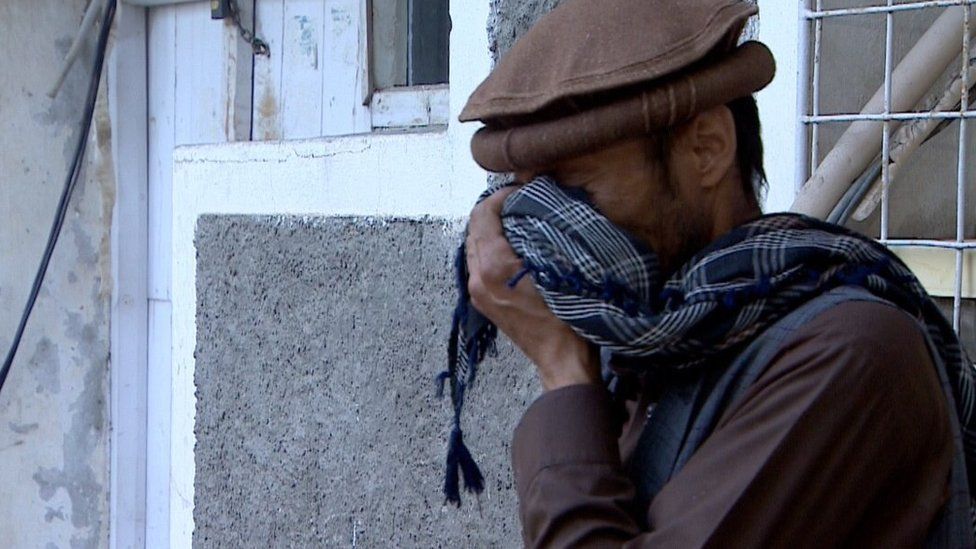Kabul bomb: Grief and anger at bomb devastation
- Published

Outside the morgue of the Wazir Akbar Khan hospital in Kabul a group of men have just identified the body of one of their relatives.
He had been working as a security guard for the German embassy and was killed in the explosion that struck Kabul on Wednesday.
His brother shows me his remains, offering me a scarf for the smell. It's a horrific sight - a badly-burnt torso and some limbs stuffed into a body bag.
His uncle, Zakiullah, says they were only able to identify the body through a distinctive birthmark. The victim's head had been completely blown off.
"There were dozens of bodies in the morgue and they're all burnt beyond recognition. We've only just found him after two days of searching for him."
'Everyone was injured'
Attacks are common in Kabul. There have been half a dozen major ones in the city already this year, carried out by the Taliban and the so-called Islamic State.
Targets have included the Afghan parliament, the Supreme Court and a military-run hospital. The vast majority of casualties are inevitably Afghan civilians.
The attack on 31 May, however, was one of the largest in Afghanistan since the Taliban were overthrown in 2001. Windows of buildings across the city shattered due to the bomb's power.
About 90 people were killed.
Builders work to repair Kabul's bomb-struck Green Zone
It is thought that the attacker wanted to gain access to the city's Green Zone - the heavily-fortified area where most foreign embassies are located.
However, the tanker filled with explosives was stopped by security guards just outside the large blast walls of the Green Zone, so he detonated his explosives where he was.
The offices of Afghanistan's largest mobile phone company, Roshan, were almost directly opposite the site of the explosion. The three-storey building collapsed.
Now being treated in hospital for wounds to his stomach, Abdul Rashid was one of the luckier employees
"All the people were trapped under the rubble, everyone was injured - I would say 80 or 90% of my colleagues were hurt."
No militant group has yet claimed the attack, perhaps because of the high civilian death toll. But Afghan authorities have accused the Taliban-linked Haqqani network and Pakistan's intelligence service, the ISI, of being behind the attack.
Pakistan vigorously denies the claim, but many Afghans rightly or wrongly believe Pakistan is responsible for the Taliban and their violence.
Outside a hospital run by an Italian NGO, Afghans waiting to see their injured relatives did blame Pakistan. One said: "The ISI are sending suicide attackers here… Pakistan has looted our country for years."
But their strongest criticism was for their own government. "Whoever is responsible for the attacks, it's the job of our government to stop them," one person said.
'Only the poor are killed'
English teacher Nawaz Hafizi ran for 40 minutes through Kabul to visit his brother in hospital on the day of the attack, thinking he was about to die. His brother now seems to be recovering but Mr Hafizi is scathing about the Afghan government
"The government is sleeping. All their families are living abroad, relaxing. It's only the poor people here who are killed, no-one else."
Najibullah Azad, a spokesman for the Afghan president, said that while this attack had succeeded, the authorities manage to "catch terrorists every few days".
He added: "With the number of security forces we have, we are doing well."
Mr Azad said he hoped that more foreign troops would be sent to Afghanistan to help train Afghan forces. The United States is due to decide whether to commit an extra 3,500 soldiers to the country.
On Friday, around 1,000 protesters gathered close to the site of the explosion for a demonstration.
Police fired live rounds and water cannons at the crowds as they approached the presidential palace. At least one protester was killed.
Some at the protest were calling for prisoners from the Haqqani network and Taliban to be executed. But anger was directed all round - at international forces, and particularly the Afghan president and his government for the lack of security.
Protests of this size following attacks are unusual in Afghanistan and are an indication of the level of public anger this bombing has caused.
Security in Kabul is steadily deteriorating - last year saw the highest number of recorded civilian casualties.
Among those who lost their lives in this latest attack was Mohammed Nazir - a driver for the BBC and a much respected and loved colleague. He is one of the many Afghans to leave on his morning commute, and tragically never return home.
- Published2 June 2017
- Published1 June 2017
- Published12 January 2017
- Published1 June 2017
- Published25 February 2017
- Published31 May 2017
- Published1 June 2017